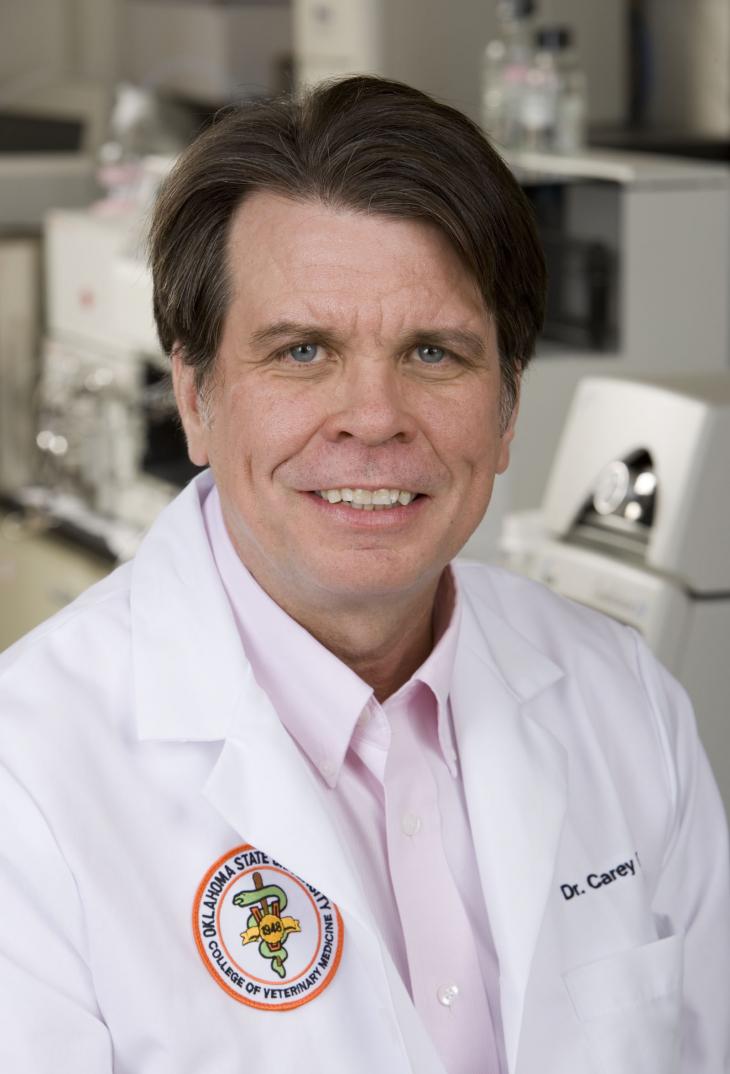
Pope Recognized
Friday, October 9, 2015
He grew up in Pasadena, Texas, earning an undergraduate degree from Stephen F. Austin in Nacogdoches, Texas. He worked for a while as a research technician at M.D. Anderson. It was here that he made a decision that would map the rest of his professional career. Meet Carey Pope, PhD, Sitlington Endowed Chair in Toxicology in the Department of Physiological Sciences at Oklahoma State University’s Center for Veterinary Health Sciences.
“While at Stephen F. Austin, I talked to a professor who asked about my interests,” said Pope. “He mentioned ‘toxicology’ as an important area and that a colleague of his who worked in ‘pesticides.’ That conversation was during the 1970’s when environmental awareness was increasing. Chemicals like DDT and PCBs were being recognized as world-wide contaminants, showing up in places like the Arctic Circle and pristine lakes in the Rocky Mountains. So I decided that the toxicity of pesticides would be an exciting, relevant field of study.”
And attention he gave it. After working at M.D. Anderson for two years, he joined the doctoral program at the University of Texas in Houston. Pope has spent the last 29 years researching pesticide toxicology. Known world-wide as a leader in this field, OSU recognized Pope twice honoring him with the Regents Distinguished Research Award in 2005 and again in 2015. Pope was also appointed as a Regents Professor in 2007.
“To receive the Regents Distinguished Research Award again in 2015 makes me appreciate the people I work with more than anything else,” said Pope. “I’ve spent a lot of time trying to foster research in our college and the University in general, and I appreciate that my colleagues recognize my efforts.”
Pope credits one of his earlier papers for a long-term concept in his research program.
“Comparing the effects of different organophosphorus pesticides led me to think about this class of chemicals as a set of similar but unique chemicals, sharing one toxic mechanism but having distinct additional actions that might lead to selective toxicity. In other words, the organophosphorus pesticides may share a common mechanism but they may not all work through the same mechanisms, as was commonly believed at the time,” he added. “That hypothesis formed the basis of a review paper that’s been my most cited publication to date.”
“I think our work had an impact on risk assessment of these pesticides and how chemicals in different classes are evaluated and regulated,” continued Pope. “Looking at mechanisms of toxicity not just in a linear manner but as a more complex set of interacting events helps us better understand how these chemicals actually work and how to better protect people, animals and the environment from their adverse effects.”
Pope’s laboratory is currently working with a group of scientists on a project aimed at protecting soldiers and first responders from another type of organophosphorus compounds, the nerve agents.
“This is a very interesting multi-disciplinary project that brings together the expertise of different people from different colleges throughout our campus to focus on how we can improve the protection of people from these types of chemicals.”
And for young researchers just starting out, Pope has this to offer.
“Basically invest yourself completely, think about your research as much as you can, and put the time in. This strategy has worked for me and most successful people I know. You have to be extremely interested in what you are doing or you’re not likely to succeed. There are lots of very smart, hard-working people throughout the world who are doing research. That’s why you absolutely have to be über-interested in your field and dedicated to what you are doing.”
Pope joined Oklahoma State University’s Center for Veterinary Health Sciences in 2000 as the Sitlington Chair in Toxicology.
“Being supported by the Sitlington Endowment really had a major impact on my career,” he added. “As the Sitlington Chair in Toxicology, I’ve had the opportunity to positively impact a number of people who have come through my lab. I’m really appreciative of the opportunity I had to become a ‘cowboy’ at Oklahoma State’s Center for Veterinary Health Sciences, and consider the decision to come here as one of my life’s best.”
The Regents Distinguished Research Award recognizes research excellence at Oklahoma State University. Candidates must demonstrate a distinguished record of past and continuing excellence in research and be clearly recognized nationally and internationally. Each recipient receives a $2,000 permanent annual salary increase and an award plaque.
